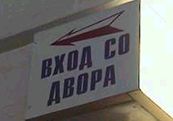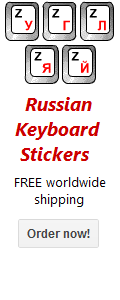 FR FR |
About us | Home | User agreement | Link to us |
The Possessive Pronouns
In the Russian language, the possessive pronouns include words мой (my), твой (familiar your), наш (our), ваш (polite your), свой. The possessive pronouns indicate that things belong to somebody or something else. And you will hear one possessive pronoun or another if you ask a question Чей? Чья? Чьё? or Чьи? For example:
Мы любуемся твоей красотой.
Чьей красотой мы любуемся?Наш город большой.
Чей город большой?Свои успехи не восхваляй.
Чьи успехи не восхваляй?
Note that English possessive pronouns have two forms: my - mine, her - hers, your - yours. In Russian, there is only one form of possessive pronouns. For instance, both "my" and "mine" are always translated as мой.
You probably have an idea of personal pronouns from our previous lessons. Just recall the third person genitive of personal pronouns (его, её, их). You may now use them like possessive pronouns. For example:
Я буду встречаться с его (её, их) братом.
The possessive pronouns change:
- by number (мой - singular, мои - plural)
- by gender (наш - masculine, наша - feminine)
- by cases (see the tables)
Мой, твоя, наш
| Case | masculine, singular |
feminine, singular |
neuter, singular |
| Nominative | мой | твоя | наше |
| Genitive | моего | твоей | нашего |
| Dative | моему | твоей | нашему |
| Accusative | мой
(animate) моего (inanimate) |
твою | наше |
| Instrumental | моим | твоей | нашим |
| Prepositional | о моём | о твоей | о нашем |
Ваш, своё, свои
| Case | masculine, singular |
neuter, singular |
any
gender, plural |
| Nominative | ваш | своё | свои |
| Genitive | вашего | своего | своих |
| Dative | вашему | своему | своим |
| Accusative | ваш
(animate) вашего (inanimate) |
своё | своих
(animate) свои (inanimate) |
| Instrumental | вашим | своим | своими |
| Prepositional | о вашем | о своём | о своих |
Now, if the possessive pronouns его, её and их
look and sound the same as personal
pronouns, how will you tell which one is which? The answer is that
you should form a question directed to these pronouns.
The personal pronouns его, её and их answer the questions Кого? Чего? For example:
Я видел её на прошлой неделе. Видел кого?I saw her last week. Whom did you see?
Он встретил их на улице. Встретил кого?
He met them on a street. Whom did he meet?Нам нужна вода. Без неё не прожить.
Не прожить без чего?
We need water. One cannot stay alive without it.
Without what one cannot stay alive?
The possessive pronouns его, её and их answer the questions Чей? Чья? Чьё? Чьи? For example:
Это её книга. Чья книга?
This is her book. Whose book is this?Это их школа.Чья это школа?
This is their school. Whose school is this?Она взяла его руку. Чью руку она взяла?
She took his hand. Whose hand did she take?
The good news is that the possessive pronouns его, её and их do not change by number and cases. Here are some examples.
| Case | Sentence |
| Nominative | Илья и его сестра. |
| Genitive | Жить у его сестры. |
| Dative | Приехать к его сестре. |
| Accusative | Повидать его сестру. |
| Instrumental | Встретиться с его сестрой. |
| Prepositional | Думать о его сестре. |
Next page > Test Yourself > Page 1, 2
Got questions?
Ask them in the Russian Questions and Answers — a place for students, teachers and native Russian speakers to discuss Russian grammar, vocabulary, pronunciation, and other aspects of the Russian language.
Copyright 2001-2026 MasterRussian.com | Privacy Policy | Contact Us
 Russian Lessons
Russian Lessons
- Russian alphabet
- Names of letters
- Russian Q&A new
- Pronunciation: Cons.
- Pronunciation: Vowels
- Noun Gender/Number
- Cases of Nouns
- Russian Greetings
- Personal Pronouns
- Learning Russian
- 1000 Common Words
- 500 Russian Verbs
- Top Russian Nouns
- » All lessons
- » Guest lessons
 Browse Topics
Browse Topics
- Start learning Russian
- Forum
- Bookstore
- Dictionaries
- Russian - basic
- Russian - adv
- Pronunciation
- Russian Blog new
- Reading
- Test & quizzes
- Translation
- Verbs
- Verb Conjugations
- Russian numbers
- Russian Tests new
- Vocabulary
- Writing
- Folk music
- Fun stuff
- Leo Tolstoy
- Learner's lore
- Literature
- Personal blogs
- Picture Dictionary new
- Proverbs
- Publications
- Radio & TV
- Russian culture
- Schools in Russia
- Russian Words
- Russian names
- Software
- Russian Words iPhone
Clicks the "Like" button below to get daily updates on Facebook!
Click "Add to circles" to learn Russian on Google+

Search MasterRussian

English » Russian dictionary

WORD OF THE DAY
![]() RSS
|
iGoogle
|
My Yahoo!
RSS
|
iGoogle
|
My Yahoo!
Meaning: to give, to let, to allow
Pronunciation: [daht']
Learn Russian words! »
TODAY'S STREET SIGN

Russian: Вход со двора
English: Entrance from the backyard
FOLLOW US ON TWITTER

MasterRussian on Twitter


